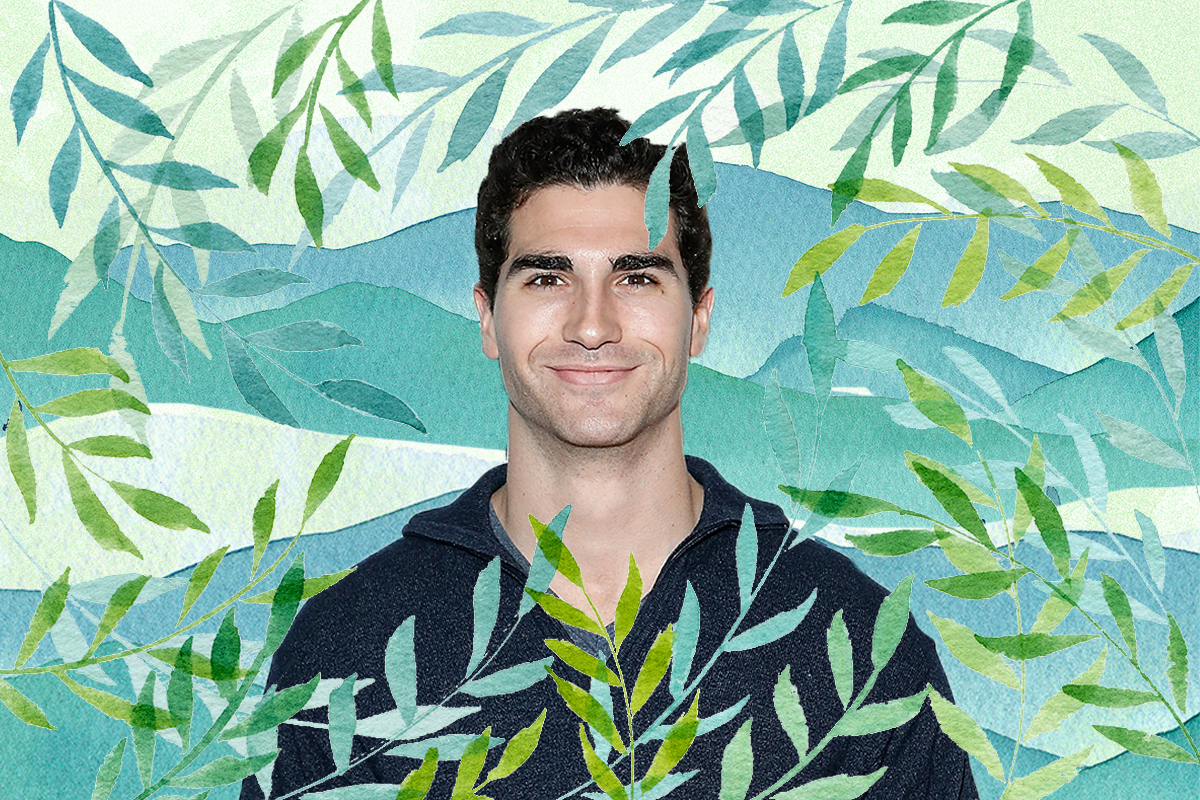The pandemic has seen many venture deeper into the great outdoors, while others have tapped into previously unexplored corners of the internet. Others have embraced both. Tobin Mitnick, a 33-year-old TikToker and Instagrammer who first started to gain major attention with his viral pinecone review, followed by his subsequent defense of 2020’s Rockefeller Center Christmas Spruce, has taken to the video-sharing platforms to spread the good news about one of his favorite subjects: trees.
And not just trees, but trees through a Jewish lens.
@jewslovetrees Casual Pine Cone Review. #fyp #jewishtiktok #plantsoftiktok #bonsai #myhobby #treetok #treehive #learnathome
@jewslovetrees Defending the Rockefeller Christmas tree. #fyp #jewishtiktok #plantsoftiktok #treetok #treehive #holidaytiktok #christmastree
With over 112k followers on his TikTok account named JewsLoveTrees, Tobin releases several short videos each week giving fun facts about trees, introducing the world of bonsai, and occasionally just sharing a little humor about Jewish life and current events.
After enjoying his erudite and charming bite-sized expositions on various trees, both those out in the wilderness of California and in his beloved bonsai garden, one might wonder what Tobin Mitnick does professionally. And when one learns that he is, in fact, an actor who has achieved primarily comedic roles in a number of productions, one might wonder: How much of the arboreal-obsessed persona shared on the internet is real?
“One-hundred percent,” he tells me. “I have a lot of fun making fun of myself.” He references his background in improv, and a particular exercise of taking a funny personal trait, such as his interest in all things tree, and pumping out bigger and louder caricatures. “I’ve always been really fascinated with naturalistic stuff. I was the kind of kid who went through phases: sharks for two years, minerals for two years…”
While he did recently dip back into the world of sharks to offer a much-needed correction to the New York Times, trees have championed his heart thoroughly enough that the majority of his content, and his TikTok handle, centers around them.
“I get really, really excited just talking about trees, just in terms of pure fact and wonder. That’s good enough for me. If you come over to my house and sit with me in the backyard, I can talk for four or five hours with you about trees.”
Tobin tries to keep a bit of whimsy in what he shares, especially since the more ethereal aspects of nature is part of what attracted him to trees in the first place. “I remember reading an entry in the World Book Encyclopedia when I was a kid, on the redwoods.” The photo showed men on horseback, dwarfed by the massive trees that Tobin wouldn’t have come across near the Pennsylvania farmhouse where he grew up. “I thought, wow, these trees just seem mystical and unreal.” His father pointed out some enormous pinecones kept in the home, clarifying that the mammoth redwoods were real and living in California.
Aside from the varieties of pine his father planted around the property, Tobin distinctly remembers two other trees right in front of the barn: a gnarly, unkempt apple tree, and a magnolia that still holds a majestic and foundational place in his mind. “The most extraordinary climbing tree. There were three or four paths to support multiple humans. That was a very special tree. To this day, it’s a very special tree. That’s the tree I think of when I close my eyes.” They even named the family dog, Maggie, after the tree.
In addition to his family and the pine-enwreathed home of his childhood, another major influence on Tobin’s environmental interests was a local Jewish educator.
“We would call him Fisherman Frank.” He taught Tobin for nursery school, in the summers, and for Aleph and Bet of Hebrew School, in addition to being friends with his mother. “Whenever we would go over there for dinner… he basically had an entire greenhouse full of natural things.” He remembers flora, fauna, and fossils. “He would show me praying mantis babies… he would show me cross sections of trees.”
Judaism and nature weren’t separate for Fisherman Frank, either. “He would reward us by bringing us down to the main sanctuary and reading us King David stories, and there’s obviously major connections between King David and nature in whatever way you want. He would always make sure to emphasize those.”
Unfortunately, neither of Tobin’s two bar mitzvah parties had a naturalistic theme. “I grew up a kind of classic child of divorce, and…” he laughs, “I never thought any of this was strange until I got to college.” The party his mother threw him was Austin Powers themed: “I had a smashing time at Toby’s bar mitzvah.” And playing into Tobin’s love of trivia, his dad “did ‘Who Wants Toby a Millionaire?’ That was a pun that he was really proud of.”
With regards to Tu Bishvat, the Jewish New Year for the Trees, an observance affiliated with the agricultural laws of the Land of Israel that has become a broader celebration of the natural world in recent decades, he has never really participated in traditional ways.
“I don’t have enough strictly observant friends who are going to get together and eat plates of fruit,” he says, referencing the kabbalastic seder that has gained popularity in some communities. “But I do have a lot of ideas for Tu Bishvat.” Tobin feels that part of the beauty of Jewish tradition is the freedom we have to graft pieces of it onto our own lives, but also add bits of our personalities back into the collective tradition, keeping Judaism functional and thrilling for different people throughout the generations. “Personally, I’m finding my way back to my faith through metaphors and trees, which is very exciting.”
This year, due to social distancing and his new role as a father, Tobin doesn’t foresee too raucous of a celebration. But in the future, he dreams of having members of his bonsai community over to share in a fruit-based liqueur, get really drunk, and repot their trees. Bonsai need to be repotted throughout their lives for healthy and dignified development, and winter is the right time to do it.
“It’s nerve-wracking, but also really exciting. This tree goes through this creative metamorphosis that you’re responsible for.” In addition to the belief that we should be developing our own rituals to keep our tradition vibrant, he admits that he was jealous of the barn raisings of the Amish and Mennonite communities he grew up near: coming together for meaningful work, and then drinking and celebrating. “I love the idea of agricultural festivals, and I wish we had more of them… I’d like to make us Jews more hobbit-like, if we’re not there already.”
He and his wife welcomed their first human “sapling,” a baby girl, last month, and followed the ancient Jewish tradition of planting a cypress in her merit. Except, due to Tobin’s aversion to the common Italian cypress, he thought more broadly and sourced another tree from the cypress family: a Hollywood juniper, which now stands high in their backyard in Los Angeles.
“I’m going to raise my daughter with an appreciation for the natural world,” Tobin says, “and hopefully show her through that that all things are connected. And I hope that she takes that with her and finds meaning in that and communicates that to other people throughout her life.”
When the film industry starts opening more auditions, Tobin feels confident that the skills he has been working to refine will have his growing fanbase see him featured in a wider variety of projects. But for now, he’s happy to share the joys and delights of trees great and small with the world through social media.
“It starts with just one tree,” he says, calling back to the Jewish ethic that saving one human life is morally equivalent to saving the entire world.
Tobin’s clever TikToking might not end deforestation, but perhaps because of his work, at least the trees who ranked well on his huggability index will be a little safer.
@jewslovetrees trees that hug good. #fyp #jewishtiktok #plantsoftiktok #treetok #treehive #bonsai #hugs #learnathome #jewish



